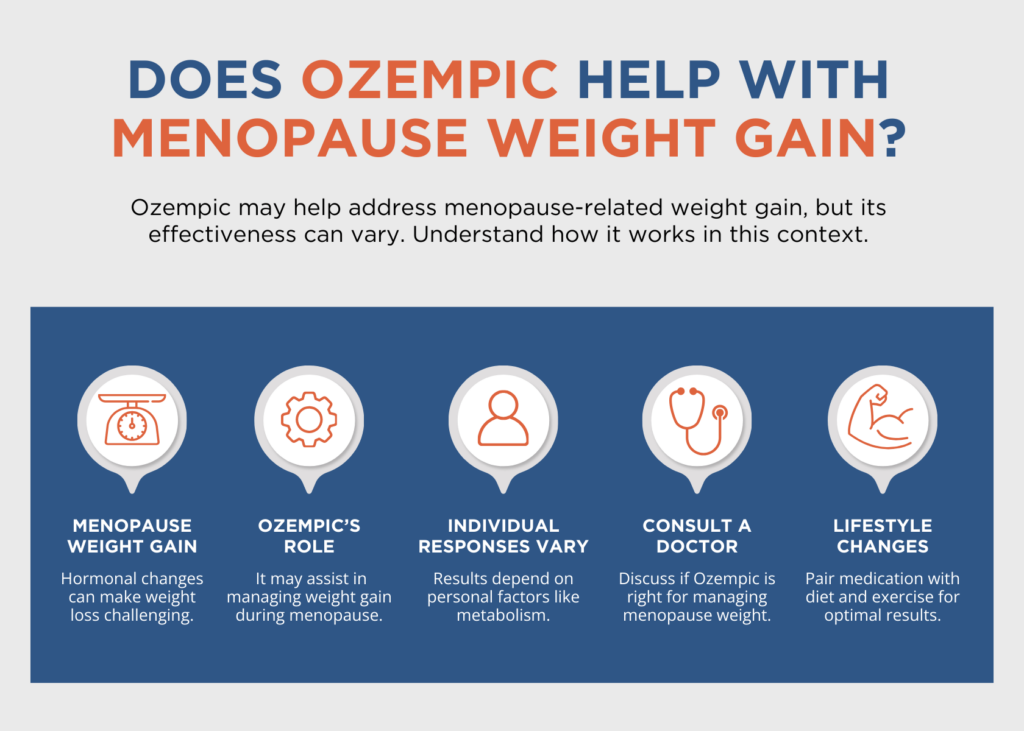The Connection Between Menopause, Weight Gain, and Ozempic
Ozempic has taken the world by storm, gaining popularity as a potential answer to weight loss challenges that affect about 70 percent of adults in the United States. Many people have turned to Ozempic to support them in their weight loss journey, but does this approach work for women going through menopause?
During menopause, your body is undergoing a significant change, throwing off your hormones and making it difficult to lose weight. Routines that worked for healthy weight management in the past may not be as effective as they used to be.
Taking Ozempic for menopause weight gain can be an effective option for women struggling to keep the weight off on their own. However, Ozempic is better used as a tool for weight loss rather than the singular solution. Ozempic should be combined with other positive lifestyle changes to maximize your weight loss success. Although it can be difficult to build healthy habits after menopause, it’s crucial for sustainable weight management.
Why Is It So Hard To Lose Weight During Menopause?
Menopause is the time when a woman stops having menstrual cycles. A woman is considered to be going through menopause when she has not had a menstrual period in at least 12 months.
During menopause, the body sees a decline in estrogen levels, which results in a wide range of side effects, including hot flashes, fatigue, mood swings, and more. These side effects also coincide with the standard effects of aging, like losing muscle mass.
With so many changes affecting the body during menopause, weight gain is a common concern for women around this age. Weight gain can start even a few years before menopause actually begins, and it can add up to around 1.5 pounds a year on average after age 50.
Some of the factors that have the most significant influence on weight changes during menopause include:
- Reduced estrogen levels – Menopause coincides with a decline in estrogen levels, which can affect the distribution of fat and lead to increased fat storage around the waist.
- Reduced activity – As the body changes during menopause, fatigue often comes with, which makes it challenging to keep up a consistent exercise routine that helps you burn calories.
- Lost muscle mass – As we get older, we tend to lose muscle mass. Lower muscle mass leads to a slower metabolism, which can often lead to weight gain.
- Menopausal symptoms – Direct symptoms of menopause, like hot flashes, poor sleep habits, or a bad mood, can make it difficult to maintain a consistent routine of exercising and eating healthy.
Menopause weight gain may be common, but that doesn’t mean it’s welcome. Even with the many challenges that come with maintaining a consistent weight during menopause, you do have a level of control.
What Is Ozempic?
Ozempic is a prescription medication that has become popular for its weight management potential. Ozempic contains the active ingredient semaglutide, a glucagon-like peptide-1 (GLP-1) agonist. Semaglutide mimics a hormone in the body that tells your brain that you’re full, which allows you to consume fewer total calories.
Ozempic was originally FDA-approved as a medication for type 2 diabetes, but it has gained popularity for its ability to support weight loss as well. Typically, Ozempic is taken in the form of weekly injections or a pill under the supervision of a doctor.
Experience Lasting Weight Loss Success with re:vitalize Our programs are built with sustainability in mind, empowering you with a mindset, plan, and healthy habits that bring long-term weight loss success
Can You Use Ozempic To Manage Menopause Weight Gain?
During menopause, your hormones change and throw off any established routines you may have had, often resulting in unwanted weight gain. This hormonal shift results in many changes to your eating habits. Ozempic can help with menopausal weight gain by suppressing your appetite and quelling some of those cravings.
Not everyone sees their desired results on Ozempic. It’s important to understand that the medication is often a component of a successful weight loss journey, not the whole thing.
Still, combatting weight gain during menopause isn’t always as simple as a single medication. A medication like Ozempic can be a helpful tool in combating weight loss, but it isn’t the end-all solution.
The biggest downfall of Ozempic is that it doesn’t account for many of the reasons that may cause you to gain weight in the first place, like hormonal changes or declining physical activity levels. It's important to note that there is no evidence that Ozempic directly influences hormones such as estrogen, which naturally declines during menopause.
Does Ozempic Help with Hot Flashes?
Hot flashes are a common symptom of menopause, characterized by sudden feelings of heat, sweating, and sometimes redness. Although hot flashes don’t cause weight gain during menopause, they are still unpleasant nonetheless.
While Ozempic is not specifically designed to treat hot flashes, it may offer indirect relief for some people. Ozempic’s ability to manage weight can help reduce certain menopause symptoms, like hot flashes, by improving overall hormonal balance, which may lessen their frequency and severity.
However, it’s important to note that Ozempic isn’t a direct solution for menopause-related hot flashes, and other treatments such as hormone replacement therapy or holistic lifestyle changes may be necessary for complete relief.
How Do You Get Rid of Menopause Weight Gain?
The best way to get rid of weight gain is to build healthy habits and incorporate positive lifestyle changes that work within your body’s needs. A more holistic approach can help you target the root causes of weight gain for lasting, sustainable results.
You can encourage healthy weight management during menopause by following these steps:
- Maintain a healthy sleep routine – Poor sleep throws off your hormonal balance and leads to unhealthy sugar cravings. Maintaining a consistent sleep schedule and positive sleep hygiene before bed can help you avoid weight gain pitfalls.
- Eat more nutritious, whole foods – Whole foods like fruits, vegetables, lean proteins, and whole grains give your body the fuel it needs to function. They also prevent you from eating other, less healthy options that encourage weight gain.
- Stay active – Exercise and activity are great for weight loss, burning calories, and boosting the metabolism. Movement is also great for our overall health, keeping our joints mobile and muscles strong. The best exercise is one you enjoy, whether that’s a bike ride, your favorite sport, or a walk around the neighborhood.
- Use stress management techniques – Stress is awful for our mental health, our sleep, and our metabolism. Techniques like yoga, meditation, or simply doing hobbies you enjoy can all be great ways to tackle and minimize stress.
When combined together, these strategies will go a long way toward promoting a healthy weight and supporting your overall health and wellness. Still, implementing significant lifestyle changes can be a tall task to take on without help.
At re:vitalize weight loss and wellness, we’ll support you in a holistic weight loss journey that brings long-lasting success. Our programs provide accountability through daily text message check-ins and weekly and monthly check-ins with our expert health coaches and board-certified nutritionists to monitor your progress.

Combat Menopausal Weight Gain with re:vitalize weight loss & wellness
In short, yes, Ozempic can help with menopausal weight gain, but it doesn’t address the full picture. Combining Ozempic with other holistic wellness strategies like eating better and exercising more will offer you the best results.
re:vitalize takes a holistic approach to weight loss, which means you won’t just see progress toward your weight management goals, but you’ll also see improved health and wellness, like better sleep habits, better energy levels, and a more positive mindset.
Using our biometric technology and our Body Composition & Metabolic Age Analysis, we’ll gather information about your unique biochemistry. With this information, we’ll help you identify which foods are optimal for your weight loss and build a roadmap to include them in your diet.
Schedule a consultation with us at re:vitalize weight loss & wellness to learn more about our programs.



